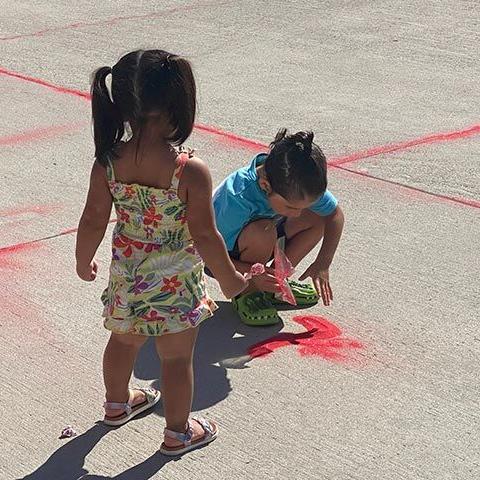Ponca Tribe partners with Red Sand Project to raise human trafficking awareness – Norfolk Daily News

An estimated 40.3 million people worldwide, including in Northeast Nebraska, are victims of human trafficking.
Many victims don't know they are being trafficked and others are looking for a way out. And according to area trafficking and domestic violence advocates, all too many victims and survivors of trafficking “fall through the cracks.”
So, as a way to call attention to the people affected by human trafficking — including children, women and refugees — the Ponca Tribe of Nebraska is holding Red Sand Project events at each of its nine service locations, including in Norfolk.
The Red Sand Project is a participatory artwork created by Molly Gochman that uses sidewalk interventions and earthwork installations to create opportunities for people to question, connect and take action against vulnerabilities that can lead to human trafficking and exploitation.
Attendees at Red Sand Project events spread red sand across cracks in the concrete as a way to recognize the victims and survivors who have fallen through the cracks.
On Friday, a group of people — mostly mothers and their children — gathered at the Ponca Tribe of Nebraska's Norfolk office at 1800 Syracuse Ave. to partake in the sand spreading project.
Adrianna Buffalochief Hoffman, human trafficking coordinator for the Ponca Tribe of Nebraska, organized Friday's event in Norfolk. She said before she started working as a human trafficking coordinator, she stereotyped trafficking as something that happened only in bigger cities.
But trafficking — including labor trafficking and sex trafficking — happens everywhere, she said, and working with victims and survivors has helped her fully understand the importance of informing the public about the issue.
“We're advocating for and with the survivors and victims by doing this,” Buffalochief Hoffman said. “When we pour the red sand, it's a symbol of the current victims and survivors that go unacknowledged. Red is a color that illustrates the sense of urgency in increasing awareness surrounding human trafficking.”
Buffalochief Hoffman also said in addition to Red Sand Project events, the Ponca Tribe of Nebraska works with nonprofit organizations and law enforcement agencies to combat human trafficking. Additionally, the tribe does outreach at high schools and middle schools to help students learn about the dangers of human trafficking.
Many victims of different types of trafficking don't know they are being trafficked, Buffalochief Hoffman said. People who might be victims of labor trafficking should ask themselves:
— Am I able to come and go as I please?
— Do I ever go unpaid for my work?
— Does my employer keep my physical identification?
— Do I work excessively long or unusual hours, often without breaks?
— Am I ever unaware of where I am working?
— Do I owe my employer money, and, if so, is that owed money taken out of my pay?
With human trafficking, perpetrators who cause harm typically do not discriminate based on age, race or gender and, instead, they look for those who are most vulnerable, including people in need of money, clothing, shelter or food, or people who have experienced additional trauma in their lives.
Like labor trafficking, sex trafficking is also common across the United States. Potential victims of sex trafficking should ask themselves:
— Am I constantly in the presence of someone else who watches over me?
— Does anyone ask me to have sex for money, shelter, food or clothing?
— Am I paid little or paid only through tips?
— Does my employer, significant other, friend or family member threaten to harm me if I don't comply with their requests?
Contrary to what many people believe, most trafficking victims are not kidnapped, according to the Ponca Tribe of Nebraska.
Some groomers become romantically involved with their target and then force or manipulate their victim to prostitute themselves. Other perpetrators lure their targets with false promises of a job, and other offenders force their children or family members to sell sex to support the household.
“Anyone can be a victim of trafficking, and anyone can be a perpetrator,” Buffalochief Hoffman said. “Most people involved look like the people you see every day.”
Buffalochief Hoffman said the Ponca Tribe of Nebraska provides services to only Native American clients, but any victim or survivor looking for assistance may contact the tribe and receive referrals to resources such as Legal Aid of Nebraska or Bright Horizons.
Services from the tribe include mental and behavioral health treatment, emergency assistance, in-state relocation, medical care and transportation.
Besides its Norfolk location, the Ponca Tribe of Nebraska has offices in Niobrara, Lincoln and Omaha.
Looking for help?
Nebraska residents who believe they are victims of human trafficking may call the National Human Trafficking Hotline at 1-888-373-7888 or text “help” to 233733. Victims also may contact local law enforcement.
This “Eyes on Trafficking” story is reprinted from its original online location.
 ABOUT PBJ LEARNING
ABOUT PBJ LEARNING
PBJ Learning is a leading provider of online human trafficking training, focusing on awareness and prevention education. Their interactive Human Trafficking Essentials online course is used worldwide to educate professionals and individuals how to recognize human trafficking and how to respond to potential victims. Learn on any web browser (even your mobile phone) at any time.
More stories like this can be found in your PBJ Learning Knowledge Vault.
EYES ON TRAFFICKING
This “Eyes on Trafficking” story is reprinted from its original online location.
ABOUT PBJ LEARNING
PBJ Learning is a leading provider of online human trafficking training, focusing on awareness and prevention education. Their interactive Human Trafficking Essentials online course is used worldwide to educate professionals and individuals how to recognize human trafficking and how to respond to potential victims. Learn on any web browser (even your mobile phone) at any time.
More stories like this can be found in your PBJ Learning Knowledge Vault.
